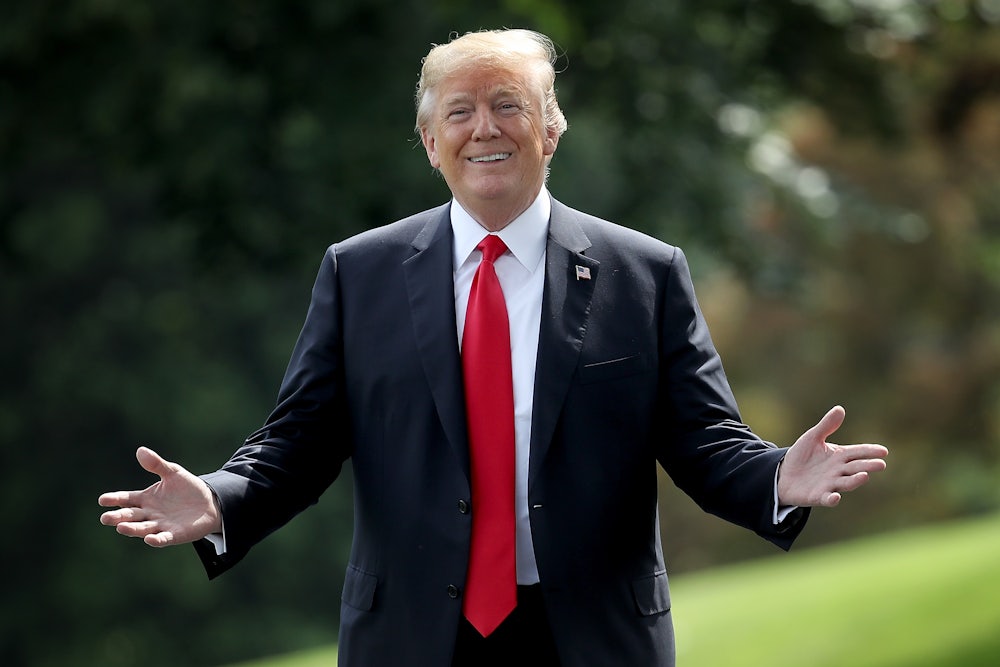A whistleblower may very well end Donald Trump’s presidency. The administration official who flagged Trump’s attempt to get the Ukrainian president to target one of his potential opponents in the 2020 race set off a cascading series of events that has resulted in an impeachment inquiry. The official’s identity remains unknown, despite Trump’s very public efforts to root them out.
While Congress was grilling figures connected to the Trump-Ukraine scandal on Tuesday, another sort of whistleblower re-emerged. The anonymous author of the bombshell New York Times op-ed “I am Part of the Resistance Inside the Trump Administration” has written a tell-all book, called A Warning, to be published next month. It is being billed as “an unprecedented behind-the-scenes portrait of the Trump presidency” that will “offers a shocking, firsthand account of President Trump and his record.” The identity of Anonymous, described as a “senior” White House official, is also unknown, setting up a parallel with the whistleblower who has thrust Trump’s administration into crisis.
But that is where the parallels end. The author of A Warning is not really like the whistleblower who risked his career—and possibly more—in reporting Trump’s possibly criminal behavior through the proper channels. They are more like Michael Wolff or Bob Woodward, their book another gossipy tale of palace intrigue in which a cabal of heroic civil servants tries to save the republic from a norms-busting ogre.
In fact, Anonymous’s book promises to be an even more ethically compromised account than Wolff’s Fire and Fury and Siege or Woodward’s Fear, which are notorious for their thin and difficult-to-parse sourcing. Unlike Anonymous, Wolff and Woodward are at least journalists, with no serious political agenda. This Deep State Elena Ferrante, in contrast, is someone who has continued to work for Trump because of, in the words of their 2018 op-ed, of the “bright spots … that the near-ceaseless negative coverage of the administration fails to capture: effective deregulation, historic tax reform, a more robust military, and more.”
One thing we have not been lacking are shocking first-hand accounts of the president’s behavior. Tip sheets like Politico’s Playbook and Axios lead the day with accounts of the president’s erratic behavior, while newspapers like The New York Times and The Washington Post have made a veritable genre of the president-has-lost-his-damn-mind story. We know how this story goes: He has shut himself off in the residence, live-tweeting as he flips through cable news channels. He rages at cabinet officials and aides. He muses about some barbaric remedy for undocumented immigration, or the U.S. military nuking hurricanes. And he is obsessed with conspiracy theories about the Deep State’s campaign to bring him down.
Trump entered office promising he would be the “most transparent president in history” and he has, in a weird way, kept that promise: His administration has been defined by an endless torrent of leaks that reveal both critical information (such as his phone calls with foreign leaders) and juicy tidbits about the president’s mental and emotional state.
The author of A Warning promises to be above such tawdry gossip. Their 2018 op-ed made the case that they were part of a loose-knit group of bureaucrats out to protect the country from a mad king. They were doing their part “thwarting Mr. Trump’s more misguided impulses until he is out of office.” But the op-ed itself is really a well-worn list of criticisms of the president: He is “immoral” and “engages in repetitive rants, and his impulsiveness results in half-baked, ill-informed, and occasionally reckless decisions that have to be walked back.”
Wolff and Woodward depicted the exact same dynamic over the course of three books. (Anonymous’s portrait of a group of civil servants dedicated to thwarting the president’s most destructive impulses fits neatly with Woodward’s portrait of a White House in which aides were regularly hiding executive orders from the president.) Far from being a unique insight into a unique presidency, A Warning’s best-case scenario is to be a fourth installment in what has become a series of long narratives about the president’s daily misdeeds. If Anonymous has a Ukraine-like bombshell to drop, why don’t they report it up the chain, as the whistleblower did, instead of writing a book about it?
Much of the discussion about A Warning has focused on the financial dimensions of Anonymous’s book deal with Twelve Books, an imprint of Hachette. The book, agent Matt Latimer told The Washington Post, could have fetched a seven-figure advance, but “was not written for financial reasons.” Instead, its author would donate a “substantial amount of any royalties to the White House Correspondents Association and other organizations that fight for a free press that seeks the truth.”
It’s not quite clear what it means to donate a “substantial” portion of one’s earnings. Why not, I don’t know, donate all of it? And anyway, how would anyone verify that an anonymous person was donating any of their royalties? Unless the author decides to forego all revenue, including foreign rights and whatever money comes from the inevitable film, Anonymous stands to make a sizeable profit from their supposed service to the nation.
Anonymous might respond that the whole point of staying anonymous and staying in the administration is that the public should know that there are public servants still doing the people’s business in the White House—if, that is, the people’s business is deregulating power plants and cutting taxes for the wealthy. Anonymous’s case is hurt, however, by the example of the other anonymous person who has taken much more significant risks for seemingly no personal gain—all while making revelations that could very well end—or, at least, seriously impede—Donald Trump’s presidency. That person may very well write a book at some point and make a lot of money for doing so. But they would have earned it.
